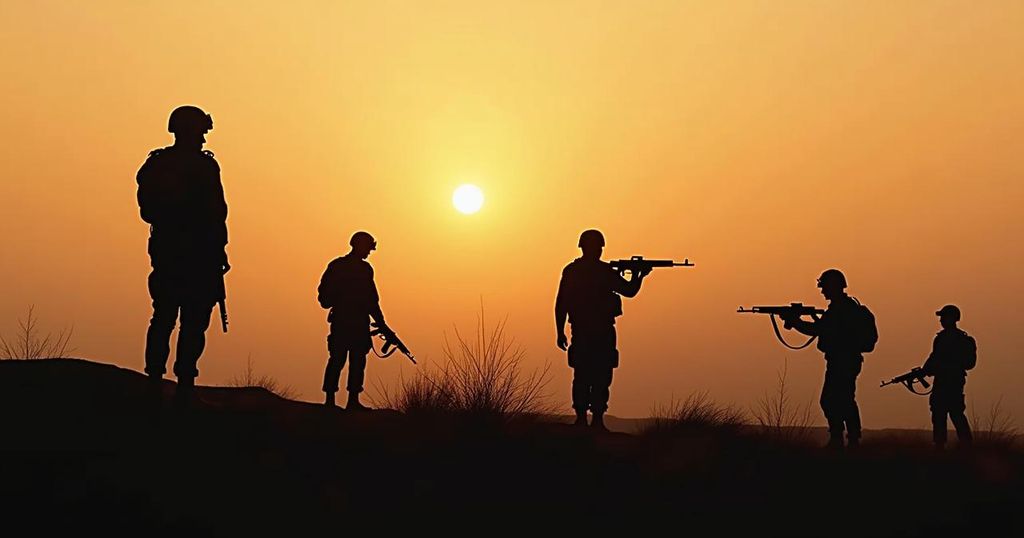Iraq Declines Involvement in Regional Conflicts Amidst Escalating Tensions

Iraqi forces linked to Tehran have chosen to remain uninvolved in Israel’s conflicts with Hezbollah and Iran due to concerns over Iraq’s stability. Instead, they are focusing on humanitarian aid for war-affected civilians. Iraqi Prime Minister Mohammed Shia al-Sudani is actively engaging with leaders to mitigate risks and enhance security. There are heightened fears of possible Israeli strikes against Iraqi targets, particularly those affiliated with the Popular Mobilization Forces, yet efforts are ongoing to prevent escalation and maintain military alertness without direct confrontation.
In light of the ongoing conflicts in the Middle East, Iraqi forces linked to Tehran have resolved to refrain from involvement in Israel’s confrontations with Hezbollah and Iran. This decision stems from concerns that further escalation could jeopardize Iraq’s stability and undermine their positions within the country. Instead, these forces are focusing their efforts on humanitarian support for civilians impacted by the hostilities in Lebanon. According to various commanders and officials from Iranian-backed factions, there will be no targeting of US interests or military installations in Iraq or Syria, at least for the time being. Recent developments, including Israel’s military actions against Gaza and its offensive against Hezbollah in Lebanon, have escalated tensions across the region. Iran’s missile strikes in retaliation for these actions further complicate the situation, leading to fears of a broader conflict. Iraqi Prime Minister Mohammed Shia al-Sudani has engaged in numerous discussions with political leaders and military commanders to address the potential ramifications of Iraqi involvement in the regional hostilities. He has called for regional cooperation to mitigate the violence that threatens to engulf neighboring countries. As tensions rise, there is speculation regarding predefined targets that Israel might aim for within Iraq, primarily those associated with the Popular Mobilization Forces (PMF), a coalition comprising various paramilitary groups. Despite fears of an extensive military response, PMF commanders have signaled their intention to avoid direct conflict and to comply with the directives of the Iraqi government. Sudani has heightened the alert for all Iraqi military units and called for caution among paramilitary groups. Preliminary agreements have been made to secure military assets and to refrain from engaging in any operations that could escalate the current crisis. It remains critical for Iraqi leadership to navigate these treacherous waters carefully to ensure the preservation of national integrity amid regional upheaval.
The backdrop of this situation involves a series of conflicts that have engendered sustained turbulence in the Middle East. Following Israel’s aggressive military operations against Gaza and its offensives against Hezbollah, numerous regional actors have been compelled to reassess their positions and strategies. Given Iraq’s precarious political and security landscape, the decision to abstain from these conflicts reflects deep-seated concerns about maintaining stability and avoiding unnecessary escalations that might lead to internal strife or foreign intervention. Iranian influence in Iraq, primarily through various paramilitary factions, underscores the complexity of the regional dynamics. The Iraqi government, led by Prime Minister Mohammed Shia al-Sudani, seeks to balance these influences while advocating for peaceful resolutions to ongoing conflicts, underlined by humanitarian concerns for those affected by warfare in nearby nations.
In conclusion, Iraqi forces committed to Iranian backing have taken a cautious stance amidst rising tensions in the Middle East, opting to abstain from involvement in Israeli confrontations. The protection of Iraq’s political and social framework remains paramount, compelling the government to focus on humanitarian aid and to necessitate dialogue with regional powers to avert deeper conflicts. Continued vigilance and strategic restraint will be crucial in navigating these complex geopolitical challenges.
Original Source: www.middleeasteye.net








